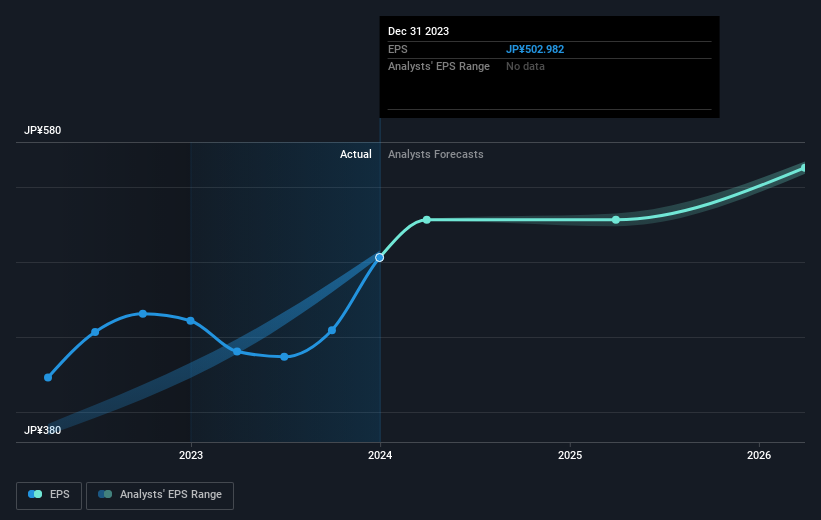Stock Analysis
- Japan
- /
- Transportation
- /
- TSE:9068
Maruzen Showa Unyu's (TSE:9068) 12% CAGR outpaced the company's earnings growth over the same five-year period

The main point of investing for the long term is to make money. Furthermore, you'd generally like to see the share price rise faster than the market. Unfortunately for shareholders, while the Maruzen Showa Unyu Co., Ltd. (TSE:9068) share price is up 57% in the last five years, that's less than the market return. However, more recent buyers should be happy with the increase of 35% over the last year.
The past week has proven to be lucrative for Maruzen Showa Unyu investors, so let's see if fundamentals drove the company's five-year performance.
View our latest analysis for Maruzen Showa Unyu
There is no denying that markets are sometimes efficient, but prices do not always reflect underlying business performance. One flawed but reasonable way to assess how sentiment around a company has changed is to compare the earnings per share (EPS) with the share price.
During five years of share price growth, Maruzen Showa Unyu achieved compound earnings per share (EPS) growth of 12% per year. This EPS growth is higher than the 9% average annual increase in the share price. So one could conclude that the broader market has become more cautious towards the stock. The reasonably low P/E ratio of 9.90 also suggests market apprehension.
You can see how EPS has changed over time in the image below (click on the chart to see the exact values).

Dive deeper into Maruzen Showa Unyu's key metrics by checking this interactive graph of Maruzen Showa Unyu's earnings, revenue and cash flow.
What About Dividends?
As well as measuring the share price return, investors should also consider the total shareholder return (TSR). The TSR is a return calculation that accounts for the value of cash dividends (assuming that any dividend received was reinvested) and the calculated value of any discounted capital raisings and spin-offs. Arguably, the TSR gives a more comprehensive picture of the return generated by a stock. In the case of Maruzen Showa Unyu, it has a TSR of 79% for the last 5 years. That exceeds its share price return that we previously mentioned. This is largely a result of its dividend payments!
A Different Perspective
We're pleased to report that Maruzen Showa Unyu shareholders have received a total shareholder return of 40% over one year. Of course, that includes the dividend. That gain is better than the annual TSR over five years, which is 12%. Therefore it seems like sentiment around the company has been positive lately. In the best case scenario, this may hint at some real business momentum, implying that now could be a great time to delve deeper. Before deciding if you like the current share price, check how Maruzen Showa Unyu scores on these 3 valuation metrics.
But note: Maruzen Showa Unyu may not be the best stock to buy. So take a peek at this free list of interesting companies with past earnings growth (and further growth forecast).
Please note, the market returns quoted in this article reflect the market weighted average returns of stocks that currently trade on Japanese exchanges.
Valuation is complex, but we're helping make it simple.
Find out whether Maruzen Showa Unyu is potentially over or undervalued by checking out our comprehensive analysis, which includes fair value estimates, risks and warnings, dividends, insider transactions and financial health.
View the Free AnalysisHave feedback on this article? Concerned about the content? Get in touch with us directly. Alternatively, email editorial-team (at) simplywallst.com.
This article by Simply Wall St is general in nature. We provide commentary based on historical data and analyst forecasts only using an unbiased methodology and our articles are not intended to be financial advice. It does not constitute a recommendation to buy or sell any stock, and does not take account of your objectives, or your financial situation. We aim to bring you long-term focused analysis driven by fundamental data. Note that our analysis may not factor in the latest price-sensitive company announcements or qualitative material. Simply Wall St has no position in any stocks mentioned.
About TSE:9068
Maruzen Showa Unyu
Provides logistics solutions in Japan and internationally.
Flawless balance sheet established dividend payer.


